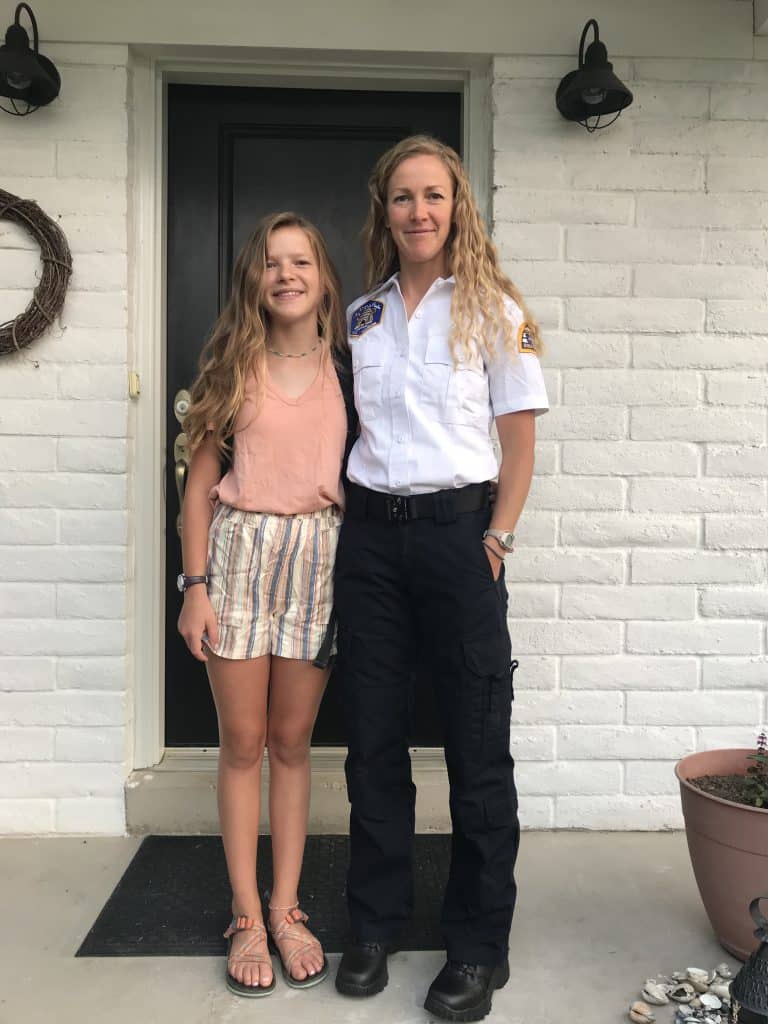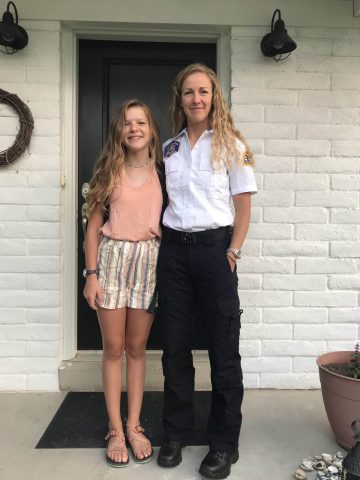By Melissa
I’ve been experiencing an identity crisis for the past four years. No, let’s call it an identity expansion. It’s actually been creeping up on me much longer, but I’ve felt the acute effects of it in the past year or so, more strongly than before. I know I’m not alone in this, but I also know other women have dealt with it better than I.
It all started when I had a faith crisis . . . no, no, I mean a “faith expansion.” Then my kids went back to school. I took a Jennifer Finlayson-Fife class — or two, or three, or four, if you add a paid podcast subscription on the pile. This helped with some of the symptoms I was feeling. But add “trying to differentiate from my husband and the church” to new symptoms I was feeling, and the expansion felt like it might burst me wide open.
I tried talking to my mother about it, but when I started asking, “Do you remember when. . ?” she responded, “No, no I don’t.” Clearly my mother had buried some feelings way down deep in order to be at peace with the identity she chose, but didn’t really choose because she was guided/guilted into it. I however, remember my mother laying on the couch all afternoon into the evening, asking me to help brown the ground beef while she continued to lay in her depression on the couch.
My father was away three months at a time serving in the Idaho state legislature. He’d come home on the weekends, but my mom was the lone parent during the week. He did this for nine years of my child/teenage-hood. My dad was also a successful attorney and my mom stayed at home to raise five kids. I was fourth in the line up and remember wanting to be around my mother until the third grade, which was when my dad entered the legislature. After that, I have many memories of a very bitter and resentful mom who was scary to be around. My mom’s time was consumed with church callings, and she was told in very patronizing ways that her most important value was in her kids and her contributions to the church.
My mom had mentioned that when she heard the infamous Benson talk about mothers needing to stay at home because it was selfish to do otherwise, she swept out the entire garage afterward to blow off steam. To get her to speak on this now or how she lived her life is an anxiety-ridden conversation that neither of us want to have with each other.
So here I am, in a semi-similar situation as my mother, that of a stay-at-home mom who put off her career long enough that starting over feels fruitless. There are so many avenues to take now that the path forward feels very daunting. That’s the sticky side of comfort. There is no one with a sword at my back forcing me to jump off a plank. I am not my family’s sole provider. But I’ll be damned if I lay on my couch and resent what could have been. I will choose to do my life differently now.
Melissa is your typical Euro/Scandinavian Utahan that actually claims Idaho (where she was born and raised) as her home. She majored in Business at Utah State, but had a midlife crisis after her kids went back to school and became an AEMT responding to 911 calls in SLC and teaching advanced EMT classes. She most enjoys being outdoors with her family hiking, canyoneering, and skiing.






19 Responses
Oh, Melissa – I don’t know know how old you are, but I feel exactly the same way! I just turned 43, and I saw my mom unhappy and unfulfilled as a stay at home mom for my sister and I, but she never would’ve admitted it.
I don’t want to live the same second half of my life as her, but I accidentally led a similar first half. I also want to work, but anywhere I start won’t pay much or be very fulfilling as an entry level position, and it doesn’t seem worth it to be gone so much. I’m also frozen with what to do, not sure as the days tick by and I keep getting older.
This is the story of so, so many of us!
Go see a college counselor and it’ll sort itself out. Opportunities will present themselves.
I am in the same boat! This post mirrors so many of my thoughts and feelings! I’ve poured all my time and energy into my husband’s identity and my children and I find myself lost. I am angry at the conditioning that I was taught as taught as a youth. It’s so hard to know where to begin.
I must say though, it is so incredibly validating to hear others share the same thoughts and feelings! We are not alone!!
A few days shy of 43, so we are I. The same boat!!! Glad to have someone …many someone’s who know how it feels♥️.
I turned 43 exactly two weeks ago today. Ha ha! I knew we’d match.
Melissa, so much of this rings true for me as well! I especially relate to the line, “To get her to speak on this now or how she lived her life is an anxiety-ridden conversation that neither of us want to have with each other.” My mother and I don’t talk about her decision to stay at home. But I do remember she once mentioned that she took the “Mother Come Home” talk as telling her to come home from EVERYTHING not just a full time job. She didn’t have any hobbies outside the home. She suffered from depression and anxiety. I learned I did not want to follow her path. I do things very differently from how she did and I think it scares her to watch me have a job and have hobbies.
Also I just want to add that I love your bio. I also studied business at USU. I’m a Utah native, but I moved to Idaho several years ago and consider it my home.
I also saw women with the same reaction – doing too much of anything away from home and family was bad (except church callings). Maybe they’d neglect their kids, not have family dinner on the table each night, have an affair, whatever. 🤷♀️
It feels more now like they were saying, “Don’t let anything get in the way of you being the 24/7 servant to your large families”.
💛💛💛
I love this post, and I resonate, esp. when it comes to my mom and I failing to connect over mental health issues we’ve shared. Damage happened in our relationship when I was in my early twenties and had my first baby while I was a student. I had bad post partum depression and very little support (no daycare access, family close by, etc.) It felt like my life was suddenly full of despair and anxiety at one, no room for anything calm, happy, hopeful. Part of me just wanted to die. It was very frightening because I didn’t even know what post-partum depression was or that it was a thing. Later realized my mom went through it herself, and her own mom had it even more severely (it caused psychosis). But when I brought up my frightening feelings, my mom denied that something was going wrong and invalidated my feelings. I felt abandoned by her then and in a few other instances of her being emotionally numb and things haven’t been the same since. Sometimes I feel guilt about how I respond to her incapacity or unwillingness to meet me where I’m at by just not being as close or in as much contact as I would otherwise. I feel grief, because as a young kid, I always assumed we’d be close. I am trying to do a better job than she did at meeting my kids where they are at and validating whatever they are going through and being a better mental health educator to them.
You post also makes me think of my sister and her in-laws. Her husband was very neglected by his young adult convert parents who followed the prophet and had a very large family despite his mom’s chronic post-partum depression that led her to wall herself up in her room while the kids did whatever and raised themselves and didn’t always have basic things they needed. The neglect led to some very big mental health problems for my bro in law that my sister has supported him through. Her in-laws deny that anything was amiss in their family, and they refuse to listen to or validate any of the differentiated perspectives in their family surrounding faith. This creates schisms and pain in the family. Some boomer parents/grandparents are doing better than others. Some of them could really have their family relationships healed and benefited from having a good dose of empathy, intimacy, humility, and honest about the family’s mental health issues perhaps especially!
I also resonate with feeling troubled by our moms being indoctrinated the believe they were most happy and fulfilled while raising children. My mom always taught me this would be the case in my life. It’s true and it’s not. I’m raising teens now and I realize this is only going to be a relatively short part of my life, and it has been incredibly stressful and taxing while also full of love and delight. And it was always hard for me to see this as true in my mom’s life. Because I always sensed she was kind of ambivalent about her role and doing it to appease other people.
It sounds like you are doing a great job moving forward and doing things that fulfill you that are very brave and very different from what you’ve done before. Thank you for sharing this short post with so much punch and honesty and resonance. I like your framing of “identity crisis” and how it interacts in relationships.
Thank you. It’s touching to read your experience as well. I read a book about “adult children of immature parents.” It sounds harsh, but it helped me realize many things and let go of many others.
It amazes me how it has taken so many years, to mid life to realize what I gave up to be a woman in the church.
I, like the rest of you have been feeling this way for several years. It’s painful to know the worth we were told we had as youth didn’t really add up to much, and after decades of giving all of yourself in that role and service, you know that you are worth sooo much more, and in no way do you want those teachings taught you as a youth, taught to your daughters. You want them to forge their own paths, blaze their own trials, be whom they were intended to be to their fullest potential, not the one limited to them via the role of man and help meet only.
I absolutely agree.💛
This is a pattern I see often in the church:
men head for the hills to enjoy brotherhood and other privileges of their power while mothers are left at home trying to perform all the labor unaided and falling apart.
We kids are the instilled with admiration for dad–because he never fell apart like mom did–while nurturing lifelong disdain for mom.
This dynamic results in victim-blaming where the victim is not at fault, she is struggling to hold up the patriarchy. My heart goes out to your mom, truly. I have been there, and I have seen the hurt and mom-blame on my children’s faces, as well as their unabashed admiration for the fresh faced dad who returned home to so much applause from his house of fans.
This is absolutely true. Something I experience and something I’ve try to forgive my Mother over, recognizing the complexity in it. Such a spot on comment you make.
This resonates. I remember my mom’s depression from being a SAHM. She slowly dug out of it, and eventually earned two masters degrees. Still puts everyone’s needs ahead of hers, though, and I physically feel the weight of that.
I’m also finding myself immobilized by depression after being a stay at home mom. I am starting a graduate program in the fall.
It makes me so angry. I remember my disdain for my mother, now it is anger and rage because I know how and why she did what she did because I have repeated the same patterns even though I told myself I wouldn’t. And the thought of my girls repeating the same patterns makes me sick to my stomach. Things are changing, maybe they will be more successful than I was. I have prioritized therapy for them and respecting their boundaries and teaching them to speak up – things I certainly didn’t get as a child – but I’ve also done it just like my mom did by putting their needs ahead of my own and sacrificing myself and my identity. My mom also always presented a sanitized view of things and I felt so lied to. I’ve tried to be more honest with my daughters and myself. It is such a sick and twisted culture.
I love the term “expansion.” As one reviews the lives of those family members trying to make sense of it, it would appear that when one can lift oneself using critical thinking skills to divest themselves of a toxic world view that holds the minds and hearts of others in the thought stopping mind prison, a sad but grateful person emerges with a future that can expend in ways that never could have been realized otherwise. Your story is heart lifting. Thank you for your courage over cowardice and desire to live free of mental myths that do so much damage.
💛
I’m just putting this out there, but it seems the majority of women I have worked with feel unfulfilled, see their kids struggling and wish they could be at home. Work for most is purely an economic necessity and not a source of any real meaning or fulfillment. Most employment is mundane and pedestrian. If you or the person in the cubicle next to you was gone, it would not really have a profound impact on any individual or the organization that employs them. To the professional world, in the scheme of things we are all nobodies. We are not nobodies to our children. In my experience, real happiness and fulfillment in life comes from the quality of one’s relationships. The most meaningful relationships are those we have with our children. Fully engaged parents who have a healthy partnership and who respect each other’s roles have the greatest chance to cultivate happy and healthy relationships with each other and with their children. So, please, let’s pretend our mothers were automatons stripped of their humanity and longing to be a clog in the wheel at some corporation. Not holding anything against those of us who have careers, but we need to stop shaming women who make the admirable decision to dedicate their lives to raising children. Am I wrong?
You make a great point. I think that we find fulfillment when we fully own our choices. So if we feel forced to work at a job we don’t like out of necessity, then it will feel as awful as finding yourself at home, never having had the chance to create a career you love. Works both ways. I 100% agree with what you say in having quality relationships and meaningful partnerships. We each have lived experiences that are hard to relate to if we didn’t live them.
Another aspect to explore is how men feel. They are expected to work, they (speaking from hearing what my husband says) would love more time with kids at home. Nothing is ideal and we have to work around that and be tough when it is not exactly what we want. But we can try. I don’t speak as someone who has figures it out, but as one working on it. I still have much to learn.